Vodafone Business Environment: Stakeholders, Policies, and Strategies
VerifiedAdded on 2019/12/04
|18
|6095
|148
Report
AI Summary
This report provides a comprehensive analysis of Vodafone's business environment, encompassing various aspects such as organizational types, stakeholder management, and the impact of economic and market forces. It identifies different organizational structures, including public and private companies, partnerships, and cooperatives, and their respective purposes. The report assesses Vodafone's fulfillment of stakeholder objectives, including employees, customers, and the government, using a stakeholder matrix to determine appropriate engagement strategies. It further explores Vodafone's corporate social responsibility, environmental, and legal responsibilities. The report delves into the nature of the UK economic system, analyzing the influence of fiscal and monetary policies, as well as competition policy, on Vodafone's operations. It examines market structure, pricing decisions, and organizational responses to market forces, alongside the impact of cultural and business environments. The report also highlights the significance of foreign trade to Vodafone and the effects of global and EU policies on its functions.

BUSINESS ENVIRONMENT
1
1
Paraphrase This Document
Need a fresh take? Get an instant paraphrase of this document with our AI Paraphraser
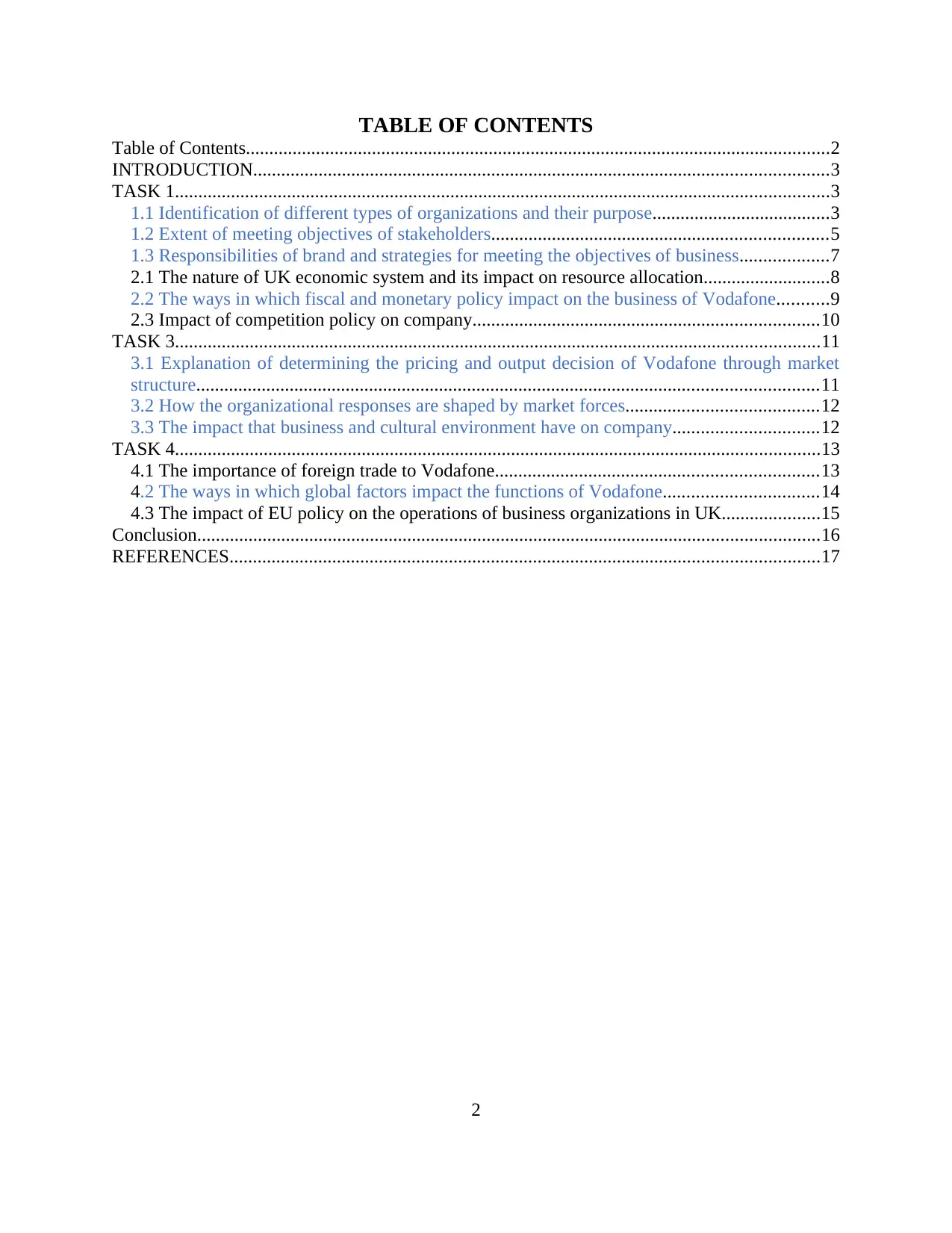
TABLE OF CONTENTS
Table of Contents.............................................................................................................................2
INTRODUCTION...........................................................................................................................3
TASK 1............................................................................................................................................3
1.1 Identification of different types of organizations and their purpose......................................3
1.2 Extent of meeting objectives of stakeholders........................................................................5
1.3 Responsibilities of brand and strategies for meeting the objectives of business...................7
2.1 The nature of UK economic system and its impact on resource allocation...........................8
2.2 The ways in which fiscal and monetary policy impact on the business of Vodafone...........9
2.3 Impact of competition policy on company..........................................................................10
TASK 3..........................................................................................................................................11
3.1 Explanation of determining the pricing and output decision of Vodafone through market
structure.....................................................................................................................................11
3.2 How the organizational responses are shaped by market forces.........................................12
3.3 The impact that business and cultural environment have on company...............................12
TASK 4..........................................................................................................................................13
4.1 The importance of foreign trade to Vodafone.....................................................................13
4.2 The ways in which global factors impact the functions of Vodafone.................................14
4.3 The impact of EU policy on the operations of business organizations in UK.....................15
Conclusion.....................................................................................................................................16
REFERENCES..............................................................................................................................17
2
Table of Contents.............................................................................................................................2
INTRODUCTION...........................................................................................................................3
TASK 1............................................................................................................................................3
1.1 Identification of different types of organizations and their purpose......................................3
1.2 Extent of meeting objectives of stakeholders........................................................................5
1.3 Responsibilities of brand and strategies for meeting the objectives of business...................7
2.1 The nature of UK economic system and its impact on resource allocation...........................8
2.2 The ways in which fiscal and monetary policy impact on the business of Vodafone...........9
2.3 Impact of competition policy on company..........................................................................10
TASK 3..........................................................................................................................................11
3.1 Explanation of determining the pricing and output decision of Vodafone through market
structure.....................................................................................................................................11
3.2 How the organizational responses are shaped by market forces.........................................12
3.3 The impact that business and cultural environment have on company...............................12
TASK 4..........................................................................................................................................13
4.1 The importance of foreign trade to Vodafone.....................................................................13
4.2 The ways in which global factors impact the functions of Vodafone.................................14
4.3 The impact of EU policy on the operations of business organizations in UK.....................15
Conclusion.....................................................................................................................................16
REFERENCES..............................................................................................................................17
2
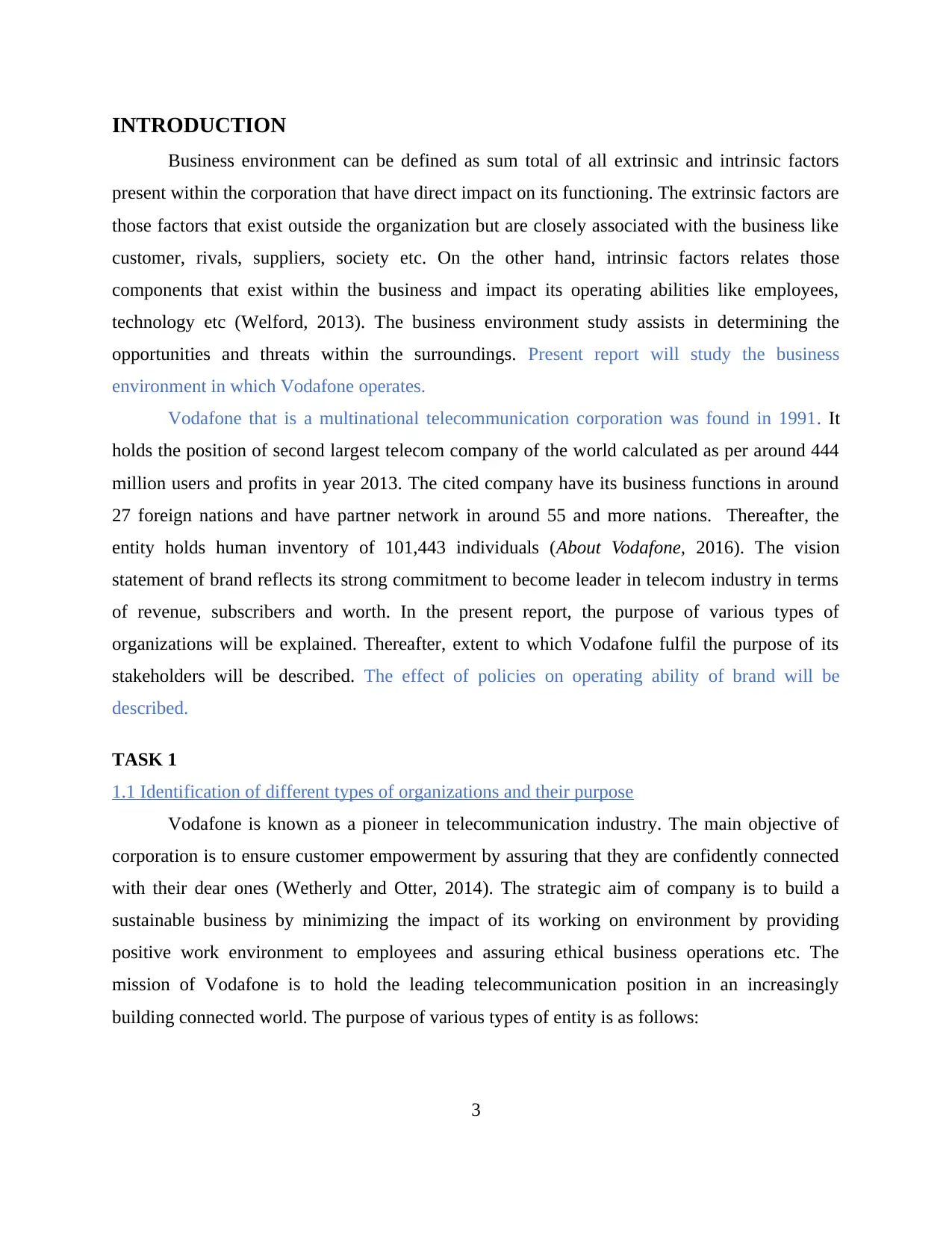
INTRODUCTION
Business environment can be defined as sum total of all extrinsic and intrinsic factors
present within the corporation that have direct impact on its functioning. The extrinsic factors are
those factors that exist outside the organization but are closely associated with the business like
customer, rivals, suppliers, society etc. On the other hand, intrinsic factors relates those
components that exist within the business and impact its operating abilities like employees,
technology etc (Welford, 2013). The business environment study assists in determining the
opportunities and threats within the surroundings. Present report will study the business
environment in which Vodafone operates.
Vodafone that is a multinational telecommunication corporation was found in 1991. It
holds the position of second largest telecom company of the world calculated as per around 444
million users and profits in year 2013. The cited company have its business functions in around
27 foreign nations and have partner network in around 55 and more nations. Thereafter, the
entity holds human inventory of 101,443 individuals (About Vodafone, 2016). The vision
statement of brand reflects its strong commitment to become leader in telecom industry in terms
of revenue, subscribers and worth. In the present report, the purpose of various types of
organizations will be explained. Thereafter, extent to which Vodafone fulfil the purpose of its
stakeholders will be described. The effect of policies on operating ability of brand will be
described.
TASK 1
1.1 Identification of different types of organizations and their purpose
Vodafone is known as a pioneer in telecommunication industry. The main objective of
corporation is to ensure customer empowerment by assuring that they are confidently connected
with their dear ones (Wetherly and Otter, 2014). The strategic aim of company is to build a
sustainable business by minimizing the impact of its working on environment by providing
positive work environment to employees and assuring ethical business operations etc. The
mission of Vodafone is to hold the leading telecommunication position in an increasingly
building connected world. The purpose of various types of entity is as follows:
3
Business environment can be defined as sum total of all extrinsic and intrinsic factors
present within the corporation that have direct impact on its functioning. The extrinsic factors are
those factors that exist outside the organization but are closely associated with the business like
customer, rivals, suppliers, society etc. On the other hand, intrinsic factors relates those
components that exist within the business and impact its operating abilities like employees,
technology etc (Welford, 2013). The business environment study assists in determining the
opportunities and threats within the surroundings. Present report will study the business
environment in which Vodafone operates.
Vodafone that is a multinational telecommunication corporation was found in 1991. It
holds the position of second largest telecom company of the world calculated as per around 444
million users and profits in year 2013. The cited company have its business functions in around
27 foreign nations and have partner network in around 55 and more nations. Thereafter, the
entity holds human inventory of 101,443 individuals (About Vodafone, 2016). The vision
statement of brand reflects its strong commitment to become leader in telecom industry in terms
of revenue, subscribers and worth. In the present report, the purpose of various types of
organizations will be explained. Thereafter, extent to which Vodafone fulfil the purpose of its
stakeholders will be described. The effect of policies on operating ability of brand will be
described.
TASK 1
1.1 Identification of different types of organizations and their purpose
Vodafone is known as a pioneer in telecommunication industry. The main objective of
corporation is to ensure customer empowerment by assuring that they are confidently connected
with their dear ones (Wetherly and Otter, 2014). The strategic aim of company is to build a
sustainable business by minimizing the impact of its working on environment by providing
positive work environment to employees and assuring ethical business operations etc. The
mission of Vodafone is to hold the leading telecommunication position in an increasingly
building connected world. The purpose of various types of entity is as follows:
3
⊘ This is a preview!⊘
Do you want full access?
Subscribe today to unlock all pages.

Trusted by 1+ million students worldwide
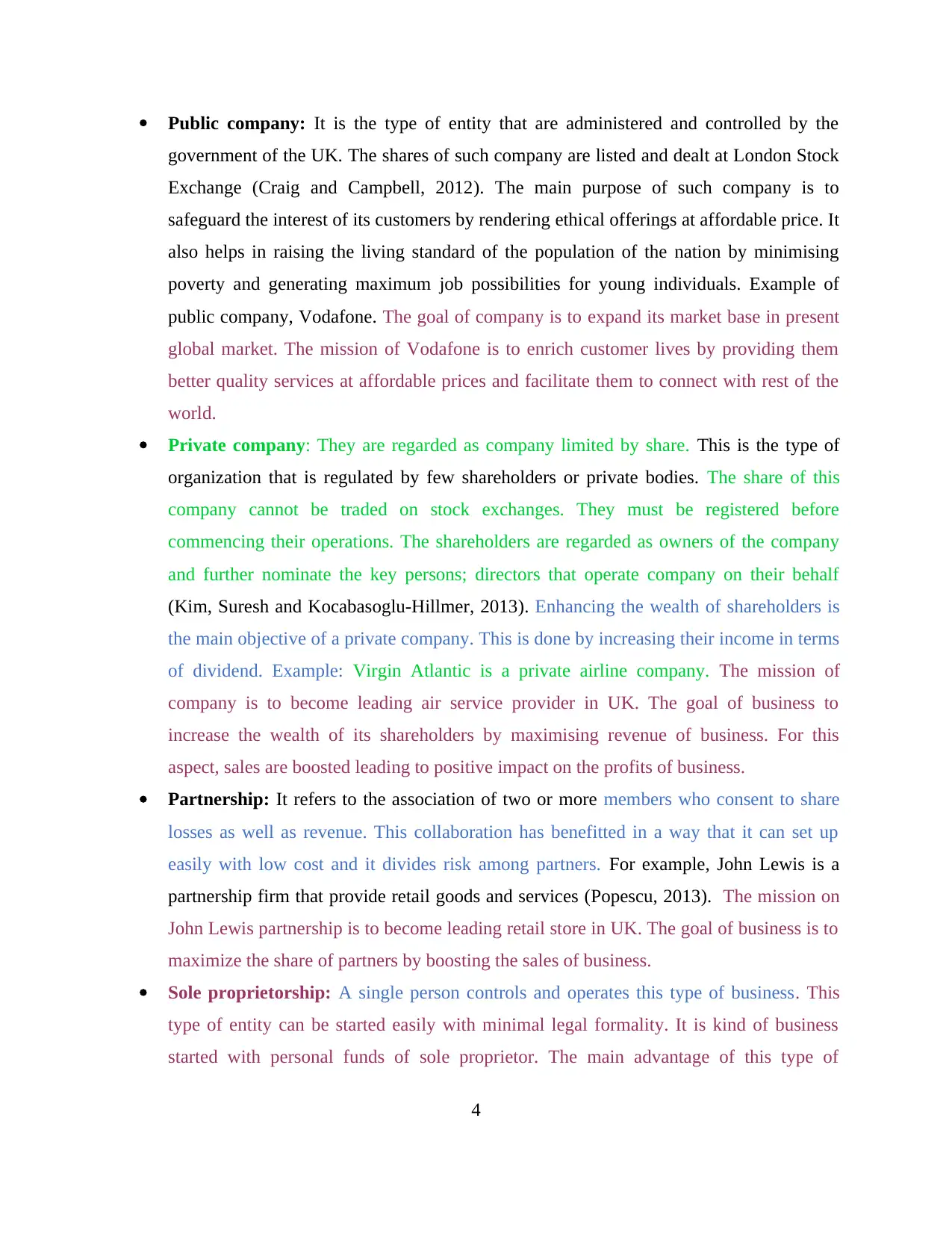
Public company: It is the type of entity that are administered and controlled by the
government of the UK. The shares of such company are listed and dealt at London Stock
Exchange (Craig and Campbell, 2012). The main purpose of such company is to
safeguard the interest of its customers by rendering ethical offerings at affordable price. It
also helps in raising the living standard of the population of the nation by minimising
poverty and generating maximum job possibilities for young individuals. Example of
public company, Vodafone. The goal of company is to expand its market base in present
global market. The mission of Vodafone is to enrich customer lives by providing them
better quality services at affordable prices and facilitate them to connect with rest of the
world.
Private company: They are regarded as company limited by share. This is the type of
organization that is regulated by few shareholders or private bodies. The share of this
company cannot be traded on stock exchanges. They must be registered before
commencing their operations. The shareholders are regarded as owners of the company
and further nominate the key persons; directors that operate company on their behalf
(Kim, Suresh and Kocabasoglu-Hillmer, 2013). Enhancing the wealth of shareholders is
the main objective of a private company. This is done by increasing their income in terms
of dividend. Example: Virgin Atlantic is a private airline company. The mission of
company is to become leading air service provider in UK. The goal of business to
increase the wealth of its shareholders by maximising revenue of business. For this
aspect, sales are boosted leading to positive impact on the profits of business.
Partnership: It refers to the association of two or more members who consent to share
losses as well as revenue. This collaboration has benefitted in a way that it can set up
easily with low cost and it divides risk among partners. For example, John Lewis is a
partnership firm that provide retail goods and services (Popescu, 2013). The mission on
John Lewis partnership is to become leading retail store in UK. The goal of business is to
maximize the share of partners by boosting the sales of business.
Sole proprietorship: A single person controls and operates this type of business. This
type of entity can be started easily with minimal legal formality. It is kind of business
started with personal funds of sole proprietor. The main advantage of this type of
4
government of the UK. The shares of such company are listed and dealt at London Stock
Exchange (Craig and Campbell, 2012). The main purpose of such company is to
safeguard the interest of its customers by rendering ethical offerings at affordable price. It
also helps in raising the living standard of the population of the nation by minimising
poverty and generating maximum job possibilities for young individuals. Example of
public company, Vodafone. The goal of company is to expand its market base in present
global market. The mission of Vodafone is to enrich customer lives by providing them
better quality services at affordable prices and facilitate them to connect with rest of the
world.
Private company: They are regarded as company limited by share. This is the type of
organization that is regulated by few shareholders or private bodies. The share of this
company cannot be traded on stock exchanges. They must be registered before
commencing their operations. The shareholders are regarded as owners of the company
and further nominate the key persons; directors that operate company on their behalf
(Kim, Suresh and Kocabasoglu-Hillmer, 2013). Enhancing the wealth of shareholders is
the main objective of a private company. This is done by increasing their income in terms
of dividend. Example: Virgin Atlantic is a private airline company. The mission of
company is to become leading air service provider in UK. The goal of business to
increase the wealth of its shareholders by maximising revenue of business. For this
aspect, sales are boosted leading to positive impact on the profits of business.
Partnership: It refers to the association of two or more members who consent to share
losses as well as revenue. This collaboration has benefitted in a way that it can set up
easily with low cost and it divides risk among partners. For example, John Lewis is a
partnership firm that provide retail goods and services (Popescu, 2013). The mission on
John Lewis partnership is to become leading retail store in UK. The goal of business is to
maximize the share of partners by boosting the sales of business.
Sole proprietorship: A single person controls and operates this type of business. This
type of entity can be started easily with minimal legal formality. It is kind of business
started with personal funds of sole proprietor. The main advantage of this type of
4
Paraphrase This Document
Need a fresh take? Get an instant paraphrase of this document with our AI Paraphraser
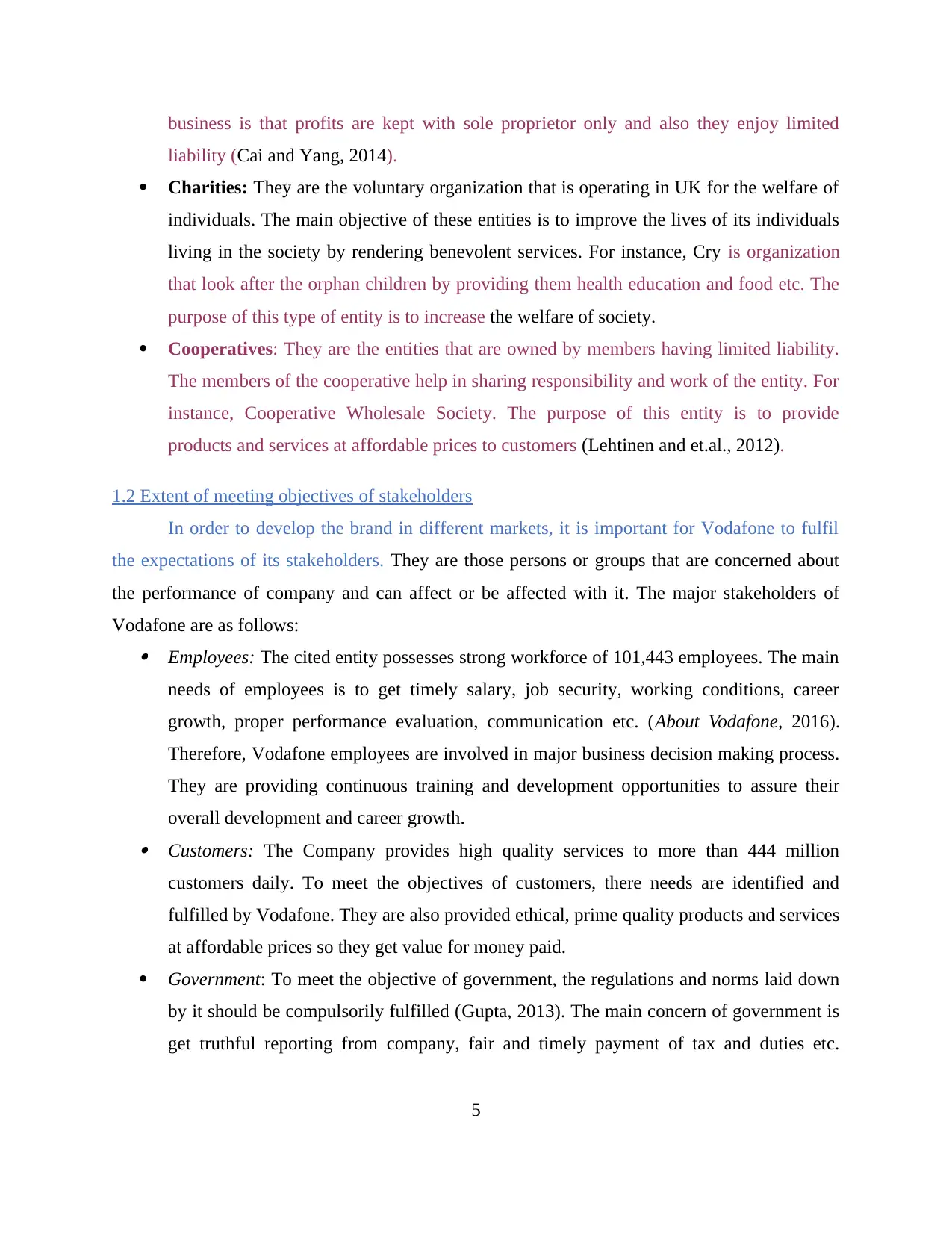
business is that profits are kept with sole proprietor only and also they enjoy limited
liability (Cai and Yang, 2014).
Charities: They are the voluntary organization that is operating in UK for the welfare of
individuals. The main objective of these entities is to improve the lives of its individuals
living in the society by rendering benevolent services. For instance, Cry is organization
that look after the orphan children by providing them health education and food etc. The
purpose of this type of entity is to increase the welfare of society.
Cooperatives: They are the entities that are owned by members having limited liability.
The members of the cooperative help in sharing responsibility and work of the entity. For
instance, Cooperative Wholesale Society. The purpose of this entity is to provide
products and services at affordable prices to customers (Lehtinen and et.al., 2012).
1.2 Extent of meeting objectives of stakeholders
In order to develop the brand in different markets, it is important for Vodafone to fulfil
the expectations of its stakeholders. They are those persons or groups that are concerned about
the performance of company and can affect or be affected with it. The major stakeholders of
Vodafone are as follows: Employees: The cited entity possesses strong workforce of 101,443 employees. The main
needs of employees is to get timely salary, job security, working conditions, career
growth, proper performance evaluation, communication etc. (About Vodafone, 2016).
Therefore, Vodafone employees are involved in major business decision making process.
They are providing continuous training and development opportunities to assure their
overall development and career growth. Customers: The Company provides high quality services to more than 444 million
customers daily. To meet the objectives of customers, there needs are identified and
fulfilled by Vodafone. They are also provided ethical, prime quality products and services
at affordable prices so they get value for money paid.
Government: To meet the objective of government, the regulations and norms laid down
by it should be compulsorily fulfilled (Gupta, 2013). The main concern of government is
get truthful reporting from company, fair and timely payment of tax and duties etc.
5
liability (Cai and Yang, 2014).
Charities: They are the voluntary organization that is operating in UK for the welfare of
individuals. The main objective of these entities is to improve the lives of its individuals
living in the society by rendering benevolent services. For instance, Cry is organization
that look after the orphan children by providing them health education and food etc. The
purpose of this type of entity is to increase the welfare of society.
Cooperatives: They are the entities that are owned by members having limited liability.
The members of the cooperative help in sharing responsibility and work of the entity. For
instance, Cooperative Wholesale Society. The purpose of this entity is to provide
products and services at affordable prices to customers (Lehtinen and et.al., 2012).
1.2 Extent of meeting objectives of stakeholders
In order to develop the brand in different markets, it is important for Vodafone to fulfil
the expectations of its stakeholders. They are those persons or groups that are concerned about
the performance of company and can affect or be affected with it. The major stakeholders of
Vodafone are as follows: Employees: The cited entity possesses strong workforce of 101,443 employees. The main
needs of employees is to get timely salary, job security, working conditions, career
growth, proper performance evaluation, communication etc. (About Vodafone, 2016).
Therefore, Vodafone employees are involved in major business decision making process.
They are providing continuous training and development opportunities to assure their
overall development and career growth. Customers: The Company provides high quality services to more than 444 million
customers daily. To meet the objectives of customers, there needs are identified and
fulfilled by Vodafone. They are also provided ethical, prime quality products and services
at affordable prices so they get value for money paid.
Government: To meet the objective of government, the regulations and norms laid down
by it should be compulsorily fulfilled (Gupta, 2013). The main concern of government is
get truthful reporting from company, fair and timely payment of tax and duties etc.
5
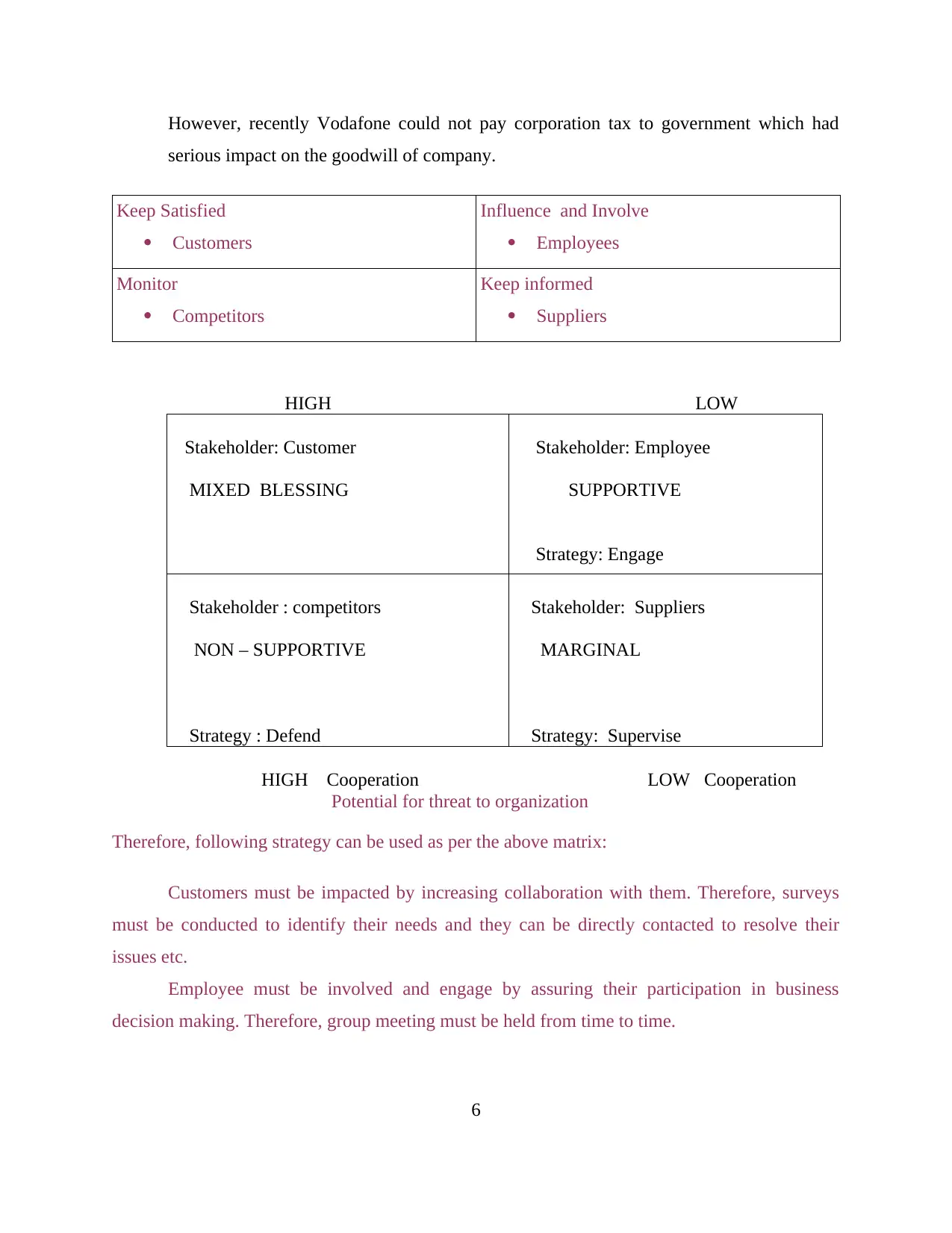
However, recently Vodafone could not pay corporation tax to government which had
serious impact on the goodwill of company.
Keep Satisfied
Customers
Influence and Involve
Employees
Monitor
Competitors
Keep informed
Suppliers
HIGH LOW
Stakeholder: Customer
MIXED BLESSING
Stakeholder: Employee
SUPPORTIVE
Strategy: Engage
Stakeholder : competitors
NON – SUPPORTIVE
Strategy : Defend
Stakeholder: Suppliers
MARGINAL
Strategy: Supervise
HIGH Cooperation LOW Cooperation
Potential for threat to organization
Therefore, following strategy can be used as per the above matrix:
Customers must be impacted by increasing collaboration with them. Therefore, surveys
must be conducted to identify their needs and they can be directly contacted to resolve their
issues etc.
Employee must be involved and engage by assuring their participation in business
decision making. Therefore, group meeting must be held from time to time.
6
serious impact on the goodwill of company.
Keep Satisfied
Customers
Influence and Involve
Employees
Monitor
Competitors
Keep informed
Suppliers
HIGH LOW
Stakeholder: Customer
MIXED BLESSING
Stakeholder: Employee
SUPPORTIVE
Strategy: Engage
Stakeholder : competitors
NON – SUPPORTIVE
Strategy : Defend
Stakeholder: Suppliers
MARGINAL
Strategy: Supervise
HIGH Cooperation LOW Cooperation
Potential for threat to organization
Therefore, following strategy can be used as per the above matrix:
Customers must be impacted by increasing collaboration with them. Therefore, surveys
must be conducted to identify their needs and they can be directly contacted to resolve their
issues etc.
Employee must be involved and engage by assuring their participation in business
decision making. Therefore, group meeting must be held from time to time.
6
⊘ This is a preview!⊘
Do you want full access?
Subscribe today to unlock all pages.

Trusted by 1+ million students worldwide
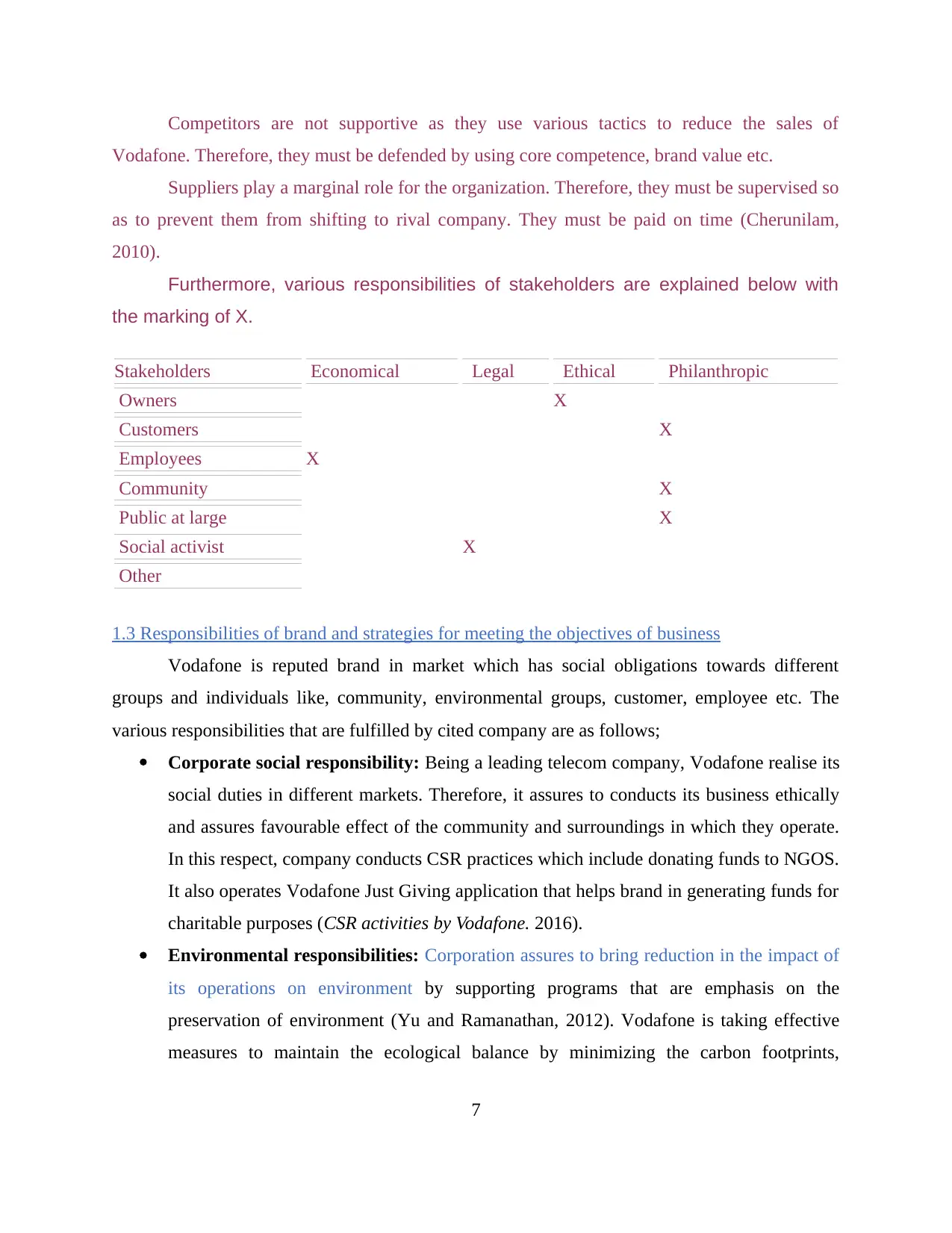
Competitors are not supportive as they use various tactics to reduce the sales of
Vodafone. Therefore, they must be defended by using core competence, brand value etc.
Suppliers play a marginal role for the organization. Therefore, they must be supervised so
as to prevent them from shifting to rival company. They must be paid on time (Cherunilam,
2010).
Furthermore, various responsibilities of stakeholders are explained below with
the marking of X.
Stakeholders Economical Legal Ethical Philanthropic
Owners X
Customers X
Employees X
Community X
Public at large X
Social activist X
Other
1.3 Responsibilities of brand and strategies for meeting the objectives of business
Vodafone is reputed brand in market which has social obligations towards different
groups and individuals like, community, environmental groups, customer, employee etc. The
various responsibilities that are fulfilled by cited company are as follows;
Corporate social responsibility: Being a leading telecom company, Vodafone realise its
social duties in different markets. Therefore, it assures to conducts its business ethically
and assures favourable effect of the community and surroundings in which they operate.
In this respect, company conducts CSR practices which include donating funds to NGOS.
It also operates Vodafone Just Giving application that helps brand in generating funds for
charitable purposes (CSR activities by Vodafone. 2016).
Environmental responsibilities: Corporation assures to bring reduction in the impact of
its operations on environment by supporting programs that are emphasis on the
preservation of environment (Yu and Ramanathan, 2012). Vodafone is taking effective
measures to maintain the ecological balance by minimizing the carbon footprints,
7
Vodafone. Therefore, they must be defended by using core competence, brand value etc.
Suppliers play a marginal role for the organization. Therefore, they must be supervised so
as to prevent them from shifting to rival company. They must be paid on time (Cherunilam,
2010).
Furthermore, various responsibilities of stakeholders are explained below with
the marking of X.
Stakeholders Economical Legal Ethical Philanthropic
Owners X
Customers X
Employees X
Community X
Public at large X
Social activist X
Other
1.3 Responsibilities of brand and strategies for meeting the objectives of business
Vodafone is reputed brand in market which has social obligations towards different
groups and individuals like, community, environmental groups, customer, employee etc. The
various responsibilities that are fulfilled by cited company are as follows;
Corporate social responsibility: Being a leading telecom company, Vodafone realise its
social duties in different markets. Therefore, it assures to conducts its business ethically
and assures favourable effect of the community and surroundings in which they operate.
In this respect, company conducts CSR practices which include donating funds to NGOS.
It also operates Vodafone Just Giving application that helps brand in generating funds for
charitable purposes (CSR activities by Vodafone. 2016).
Environmental responsibilities: Corporation assures to bring reduction in the impact of
its operations on environment by supporting programs that are emphasis on the
preservation of environment (Yu and Ramanathan, 2012). Vodafone is taking effective
measures to maintain the ecological balance by minimizing the carbon footprints,
7
Paraphrase This Document
Need a fresh take? Get an instant paraphrase of this document with our AI Paraphraser
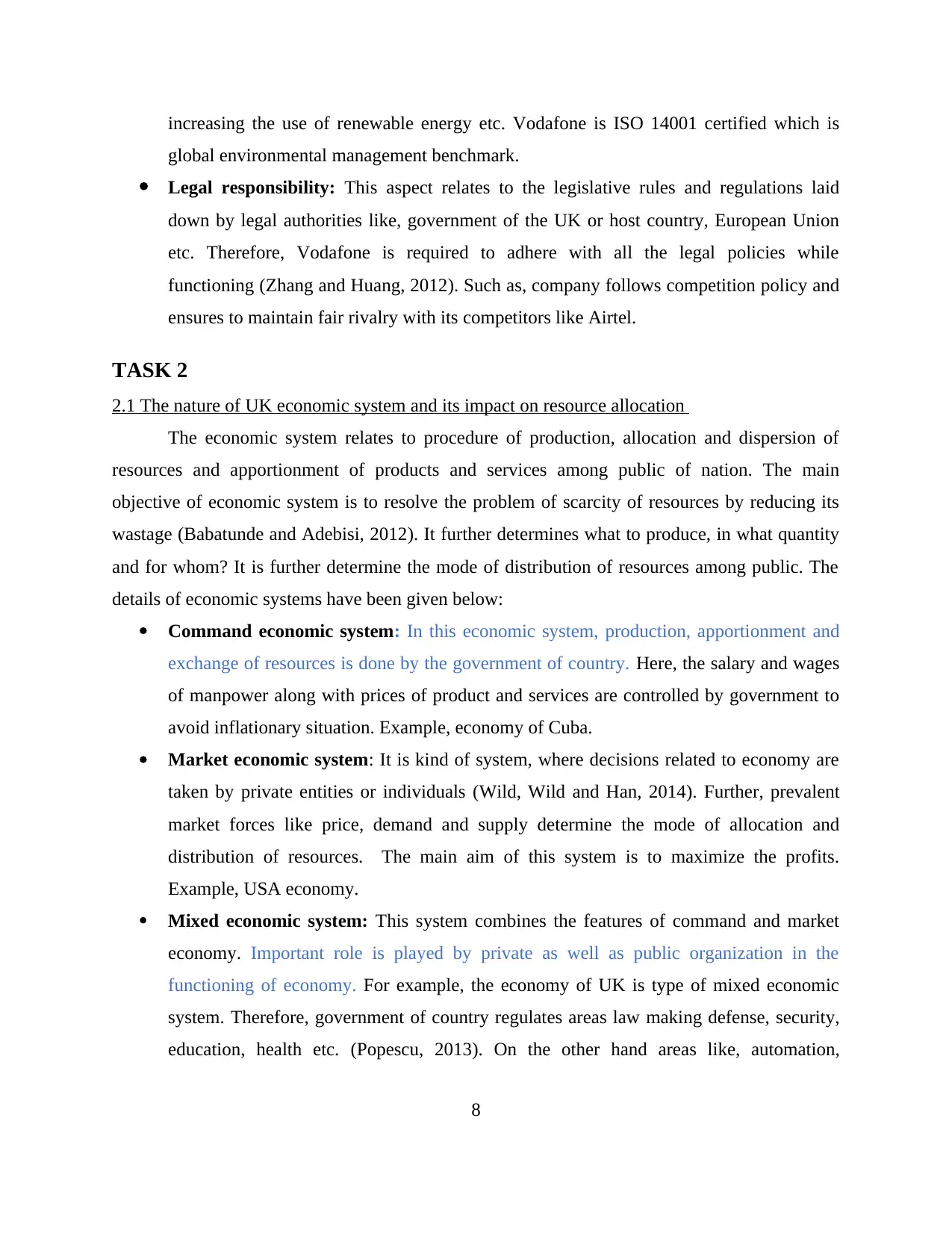
increasing the use of renewable energy etc. Vodafone is ISO 14001 certified which is
global environmental management benchmark.
Legal responsibility: This aspect relates to the legislative rules and regulations laid
down by legal authorities like, government of the UK or host country, European Union
etc. Therefore, Vodafone is required to adhere with all the legal policies while
functioning (Zhang and Huang, 2012). Such as, company follows competition policy and
ensures to maintain fair rivalry with its competitors like Airtel.
TASK 2
2.1 The nature of UK economic system and its impact on resource allocation
The economic system relates to procedure of production, allocation and dispersion of
resources and apportionment of products and services among public of nation. The main
objective of economic system is to resolve the problem of scarcity of resources by reducing its
wastage (Babatunde and Adebisi, 2012). It further determines what to produce, in what quantity
and for whom? It is further determine the mode of distribution of resources among public. The
details of economic systems have been given below:
Command economic system: In this economic system, production, apportionment and
exchange of resources is done by the government of country. Here, the salary and wages
of manpower along with prices of product and services are controlled by government to
avoid inflationary situation. Example, economy of Cuba.
Market economic system: It is kind of system, where decisions related to economy are
taken by private entities or individuals (Wild, Wild and Han, 2014). Further, prevalent
market forces like price, demand and supply determine the mode of allocation and
distribution of resources. The main aim of this system is to maximize the profits.
Example, USA economy.
Mixed economic system: This system combines the features of command and market
economy. Important role is played by private as well as public organization in the
functioning of economy. For example, the economy of UK is type of mixed economic
system. Therefore, government of country regulates areas law making defense, security,
education, health etc. (Popescu, 2013). On the other hand areas like, automation,
8
global environmental management benchmark.
Legal responsibility: This aspect relates to the legislative rules and regulations laid
down by legal authorities like, government of the UK or host country, European Union
etc. Therefore, Vodafone is required to adhere with all the legal policies while
functioning (Zhang and Huang, 2012). Such as, company follows competition policy and
ensures to maintain fair rivalry with its competitors like Airtel.
TASK 2
2.1 The nature of UK economic system and its impact on resource allocation
The economic system relates to procedure of production, allocation and dispersion of
resources and apportionment of products and services among public of nation. The main
objective of economic system is to resolve the problem of scarcity of resources by reducing its
wastage (Babatunde and Adebisi, 2012). It further determines what to produce, in what quantity
and for whom? It is further determine the mode of distribution of resources among public. The
details of economic systems have been given below:
Command economic system: In this economic system, production, apportionment and
exchange of resources is done by the government of country. Here, the salary and wages
of manpower along with prices of product and services are controlled by government to
avoid inflationary situation. Example, economy of Cuba.
Market economic system: It is kind of system, where decisions related to economy are
taken by private entities or individuals (Wild, Wild and Han, 2014). Further, prevalent
market forces like price, demand and supply determine the mode of allocation and
distribution of resources. The main aim of this system is to maximize the profits.
Example, USA economy.
Mixed economic system: This system combines the features of command and market
economy. Important role is played by private as well as public organization in the
functioning of economy. For example, the economy of UK is type of mixed economic
system. Therefore, government of country regulates areas law making defense, security,
education, health etc. (Popescu, 2013). On the other hand areas like, automation,
8
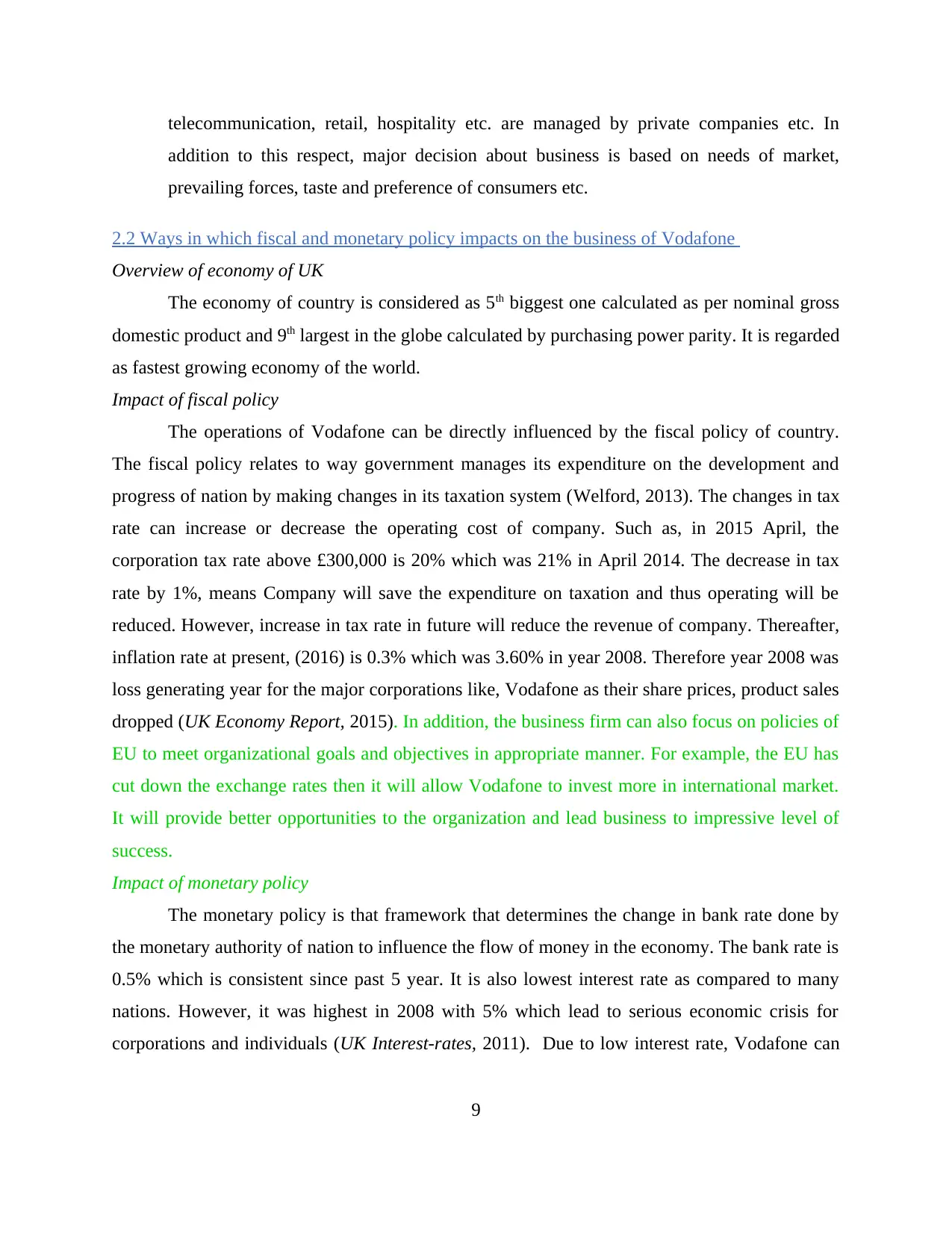
telecommunication, retail, hospitality etc. are managed by private companies etc. In
addition to this respect, major decision about business is based on needs of market,
prevailing forces, taste and preference of consumers etc.
2.2 Ways in which fiscal and monetary policy impacts on the business of Vodafone
Overview of economy of UK
The economy of country is considered as 5th biggest one calculated as per nominal gross
domestic product and 9th largest in the globe calculated by purchasing power parity. It is regarded
as fastest growing economy of the world.
Impact of fiscal policy
The operations of Vodafone can be directly influenced by the fiscal policy of country.
The fiscal policy relates to way government manages its expenditure on the development and
progress of nation by making changes in its taxation system (Welford, 2013). The changes in tax
rate can increase or decrease the operating cost of company. Such as, in 2015 April, the
corporation tax rate above £300,000 is 20% which was 21% in April 2014. The decrease in tax
rate by 1%, means Company will save the expenditure on taxation and thus operating will be
reduced. However, increase in tax rate in future will reduce the revenue of company. Thereafter,
inflation rate at present, (2016) is 0.3% which was 3.60% in year 2008. Therefore year 2008 was
loss generating year for the major corporations like, Vodafone as their share prices, product sales
dropped (UK Economy Report, 2015). In addition, the business firm can also focus on policies of
EU to meet organizational goals and objectives in appropriate manner. For example, the EU has
cut down the exchange rates then it will allow Vodafone to invest more in international market.
It will provide better opportunities to the organization and lead business to impressive level of
success.
Impact of monetary policy
The monetary policy is that framework that determines the change in bank rate done by
the monetary authority of nation to influence the flow of money in the economy. The bank rate is
0.5% which is consistent since past 5 year. It is also lowest interest rate as compared to many
nations. However, it was highest in 2008 with 5% which lead to serious economic crisis for
corporations and individuals (UK Interest-rates, 2011). Due to low interest rate, Vodafone can
9
addition to this respect, major decision about business is based on needs of market,
prevailing forces, taste and preference of consumers etc.
2.2 Ways in which fiscal and monetary policy impacts on the business of Vodafone
Overview of economy of UK
The economy of country is considered as 5th biggest one calculated as per nominal gross
domestic product and 9th largest in the globe calculated by purchasing power parity. It is regarded
as fastest growing economy of the world.
Impact of fiscal policy
The operations of Vodafone can be directly influenced by the fiscal policy of country.
The fiscal policy relates to way government manages its expenditure on the development and
progress of nation by making changes in its taxation system (Welford, 2013). The changes in tax
rate can increase or decrease the operating cost of company. Such as, in 2015 April, the
corporation tax rate above £300,000 is 20% which was 21% in April 2014. The decrease in tax
rate by 1%, means Company will save the expenditure on taxation and thus operating will be
reduced. However, increase in tax rate in future will reduce the revenue of company. Thereafter,
inflation rate at present, (2016) is 0.3% which was 3.60% in year 2008. Therefore year 2008 was
loss generating year for the major corporations like, Vodafone as their share prices, product sales
dropped (UK Economy Report, 2015). In addition, the business firm can also focus on policies of
EU to meet organizational goals and objectives in appropriate manner. For example, the EU has
cut down the exchange rates then it will allow Vodafone to invest more in international market.
It will provide better opportunities to the organization and lead business to impressive level of
success.
Impact of monetary policy
The monetary policy is that framework that determines the change in bank rate done by
the monetary authority of nation to influence the flow of money in the economy. The bank rate is
0.5% which is consistent since past 5 year. It is also lowest interest rate as compared to many
nations. However, it was highest in 2008 with 5% which lead to serious economic crisis for
corporations and individuals (UK Interest-rates, 2011). Due to low interest rate, Vodafone can
9
⊘ This is a preview!⊘
Do you want full access?
Subscribe today to unlock all pages.

Trusted by 1+ million students worldwide
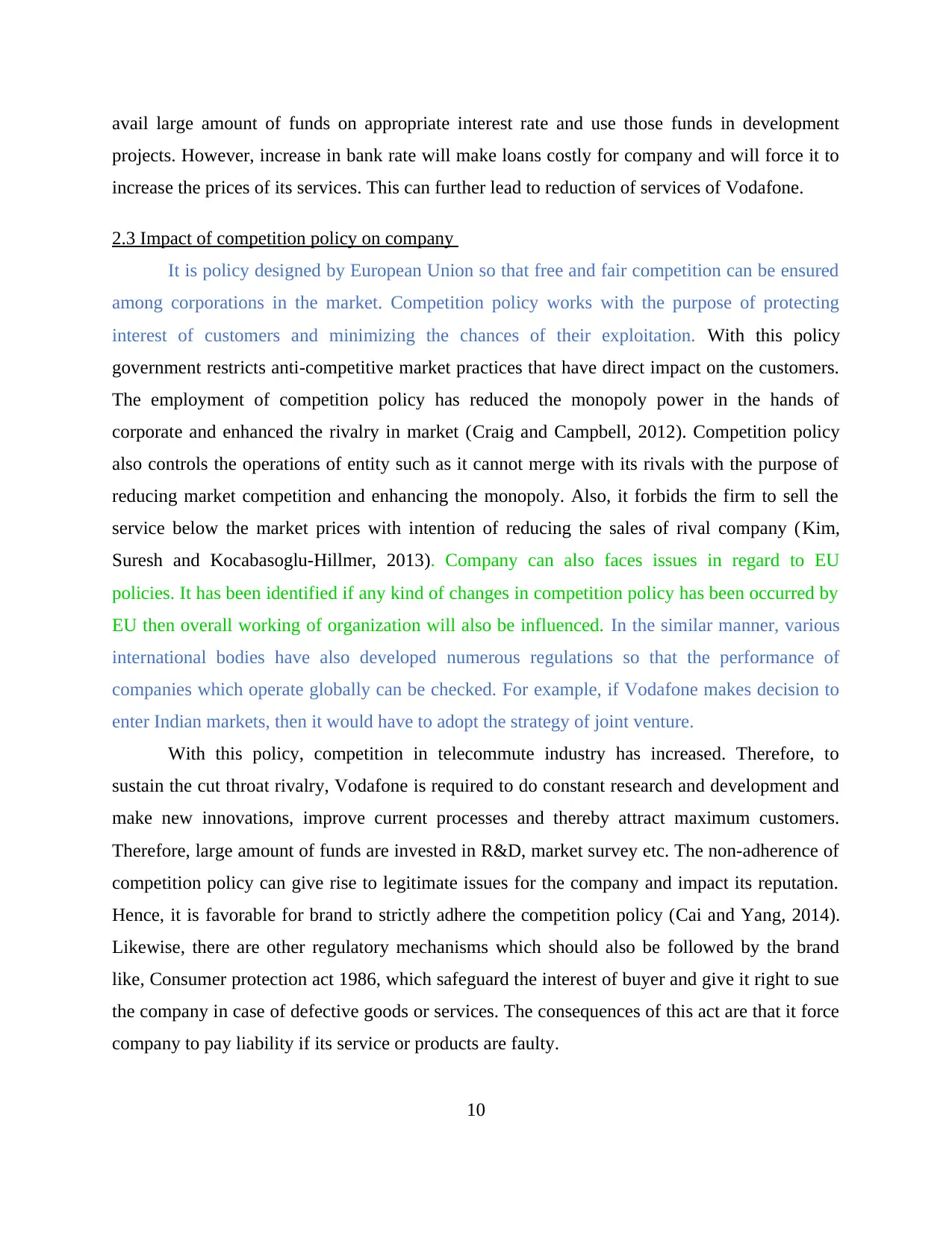
avail large amount of funds on appropriate interest rate and use those funds in development
projects. However, increase in bank rate will make loans costly for company and will force it to
increase the prices of its services. This can further lead to reduction of services of Vodafone.
2.3 Impact of competition policy on company
It is policy designed by European Union so that free and fair competition can be ensured
among corporations in the market. Competition policy works with the purpose of protecting
interest of customers and minimizing the chances of their exploitation. With this policy
government restricts anti-competitive market practices that have direct impact on the customers.
The employment of competition policy has reduced the monopoly power in the hands of
corporate and enhanced the rivalry in market (Craig and Campbell, 2012). Competition policy
also controls the operations of entity such as it cannot merge with its rivals with the purpose of
reducing market competition and enhancing the monopoly. Also, it forbids the firm to sell the
service below the market prices with intention of reducing the sales of rival company (Kim,
Suresh and Kocabasoglu-Hillmer, 2013). Company can also faces issues in regard to EU
policies. It has been identified if any kind of changes in competition policy has been occurred by
EU then overall working of organization will also be influenced. In the similar manner, various
international bodies have also developed numerous regulations so that the performance of
companies which operate globally can be checked. For example, if Vodafone makes decision to
enter Indian markets, then it would have to adopt the strategy of joint venture.
With this policy, competition in telecommute industry has increased. Therefore, to
sustain the cut throat rivalry, Vodafone is required to do constant research and development and
make new innovations, improve current processes and thereby attract maximum customers.
Therefore, large amount of funds are invested in R&D, market survey etc. The non-adherence of
competition policy can give rise to legitimate issues for the company and impact its reputation.
Hence, it is favorable for brand to strictly adhere the competition policy (Cai and Yang, 2014).
Likewise, there are other regulatory mechanisms which should also be followed by the brand
like, Consumer protection act 1986, which safeguard the interest of buyer and give it right to sue
the company in case of defective goods or services. The consequences of this act are that it force
company to pay liability if its service or products are faulty.
10
projects. However, increase in bank rate will make loans costly for company and will force it to
increase the prices of its services. This can further lead to reduction of services of Vodafone.
2.3 Impact of competition policy on company
It is policy designed by European Union so that free and fair competition can be ensured
among corporations in the market. Competition policy works with the purpose of protecting
interest of customers and minimizing the chances of their exploitation. With this policy
government restricts anti-competitive market practices that have direct impact on the customers.
The employment of competition policy has reduced the monopoly power in the hands of
corporate and enhanced the rivalry in market (Craig and Campbell, 2012). Competition policy
also controls the operations of entity such as it cannot merge with its rivals with the purpose of
reducing market competition and enhancing the monopoly. Also, it forbids the firm to sell the
service below the market prices with intention of reducing the sales of rival company (Kim,
Suresh and Kocabasoglu-Hillmer, 2013). Company can also faces issues in regard to EU
policies. It has been identified if any kind of changes in competition policy has been occurred by
EU then overall working of organization will also be influenced. In the similar manner, various
international bodies have also developed numerous regulations so that the performance of
companies which operate globally can be checked. For example, if Vodafone makes decision to
enter Indian markets, then it would have to adopt the strategy of joint venture.
With this policy, competition in telecommute industry has increased. Therefore, to
sustain the cut throat rivalry, Vodafone is required to do constant research and development and
make new innovations, improve current processes and thereby attract maximum customers.
Therefore, large amount of funds are invested in R&D, market survey etc. The non-adherence of
competition policy can give rise to legitimate issues for the company and impact its reputation.
Hence, it is favorable for brand to strictly adhere the competition policy (Cai and Yang, 2014).
Likewise, there are other regulatory mechanisms which should also be followed by the brand
like, Consumer protection act 1986, which safeguard the interest of buyer and give it right to sue
the company in case of defective goods or services. The consequences of this act are that it force
company to pay liability if its service or products are faulty.
10
Paraphrase This Document
Need a fresh take? Get an instant paraphrase of this document with our AI Paraphraser
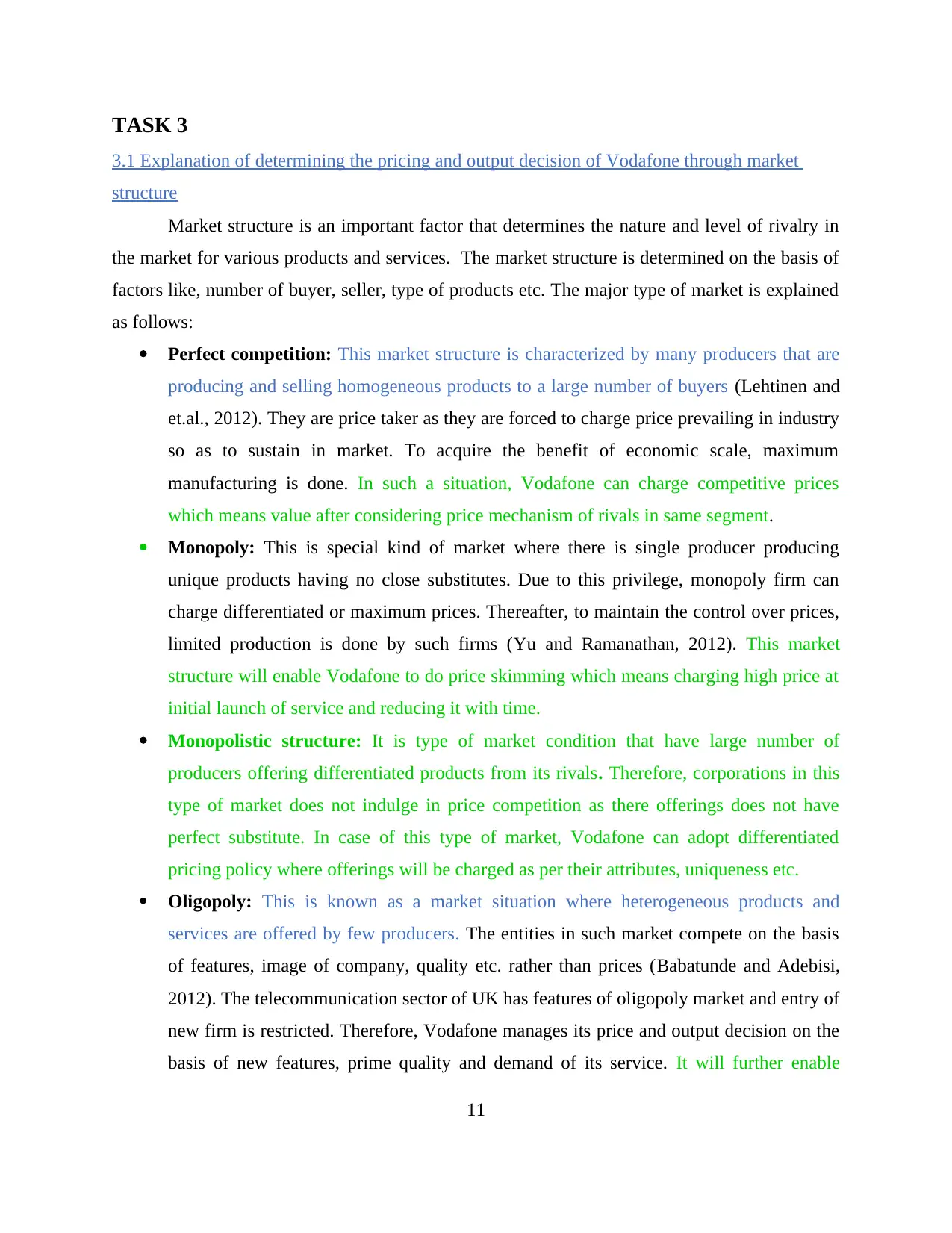
TASK 3
3.1 Explanation of determining the pricing and output decision of Vodafone through market
structure
Market structure is an important factor that determines the nature and level of rivalry in
the market for various products and services. The market structure is determined on the basis of
factors like, number of buyer, seller, type of products etc. The major type of market is explained
as follows:
Perfect competition: This market structure is characterized by many producers that are
producing and selling homogeneous products to a large number of buyers (Lehtinen and
et.al., 2012). They are price taker as they are forced to charge price prevailing in industry
so as to sustain in market. To acquire the benefit of economic scale, maximum
manufacturing is done. In such a situation, Vodafone can charge competitive prices
which means value after considering price mechanism of rivals in same segment.
Monopoly: This is special kind of market where there is single producer producing
unique products having no close substitutes. Due to this privilege, monopoly firm can
charge differentiated or maximum prices. Thereafter, to maintain the control over prices,
limited production is done by such firms (Yu and Ramanathan, 2012). This market
structure will enable Vodafone to do price skimming which means charging high price at
initial launch of service and reducing it with time.
Monopolistic structure: It is type of market condition that have large number of
producers offering differentiated products from its rivals. Therefore, corporations in this
type of market does not indulge in price competition as there offerings does not have
perfect substitute. In case of this type of market, Vodafone can adopt differentiated
pricing policy where offerings will be charged as per their attributes, uniqueness etc.
Oligopoly: This is known as a market situation where heterogeneous products and
services are offered by few producers. The entities in such market compete on the basis
of features, image of company, quality etc. rather than prices (Babatunde and Adebisi,
2012). The telecommunication sector of UK has features of oligopoly market and entry of
new firm is restricted. Therefore, Vodafone manages its price and output decision on the
basis of new features, prime quality and demand of its service. It will further enable
11
3.1 Explanation of determining the pricing and output decision of Vodafone through market
structure
Market structure is an important factor that determines the nature and level of rivalry in
the market for various products and services. The market structure is determined on the basis of
factors like, number of buyer, seller, type of products etc. The major type of market is explained
as follows:
Perfect competition: This market structure is characterized by many producers that are
producing and selling homogeneous products to a large number of buyers (Lehtinen and
et.al., 2012). They are price taker as they are forced to charge price prevailing in industry
so as to sustain in market. To acquire the benefit of economic scale, maximum
manufacturing is done. In such a situation, Vodafone can charge competitive prices
which means value after considering price mechanism of rivals in same segment.
Monopoly: This is special kind of market where there is single producer producing
unique products having no close substitutes. Due to this privilege, monopoly firm can
charge differentiated or maximum prices. Thereafter, to maintain the control over prices,
limited production is done by such firms (Yu and Ramanathan, 2012). This market
structure will enable Vodafone to do price skimming which means charging high price at
initial launch of service and reducing it with time.
Monopolistic structure: It is type of market condition that have large number of
producers offering differentiated products from its rivals. Therefore, corporations in this
type of market does not indulge in price competition as there offerings does not have
perfect substitute. In case of this type of market, Vodafone can adopt differentiated
pricing policy where offerings will be charged as per their attributes, uniqueness etc.
Oligopoly: This is known as a market situation where heterogeneous products and
services are offered by few producers. The entities in such market compete on the basis
of features, image of company, quality etc. rather than prices (Babatunde and Adebisi,
2012). The telecommunication sector of UK has features of oligopoly market and entry of
new firm is restricted. Therefore, Vodafone manages its price and output decision on the
basis of new features, prime quality and demand of its service. It will further enable
11
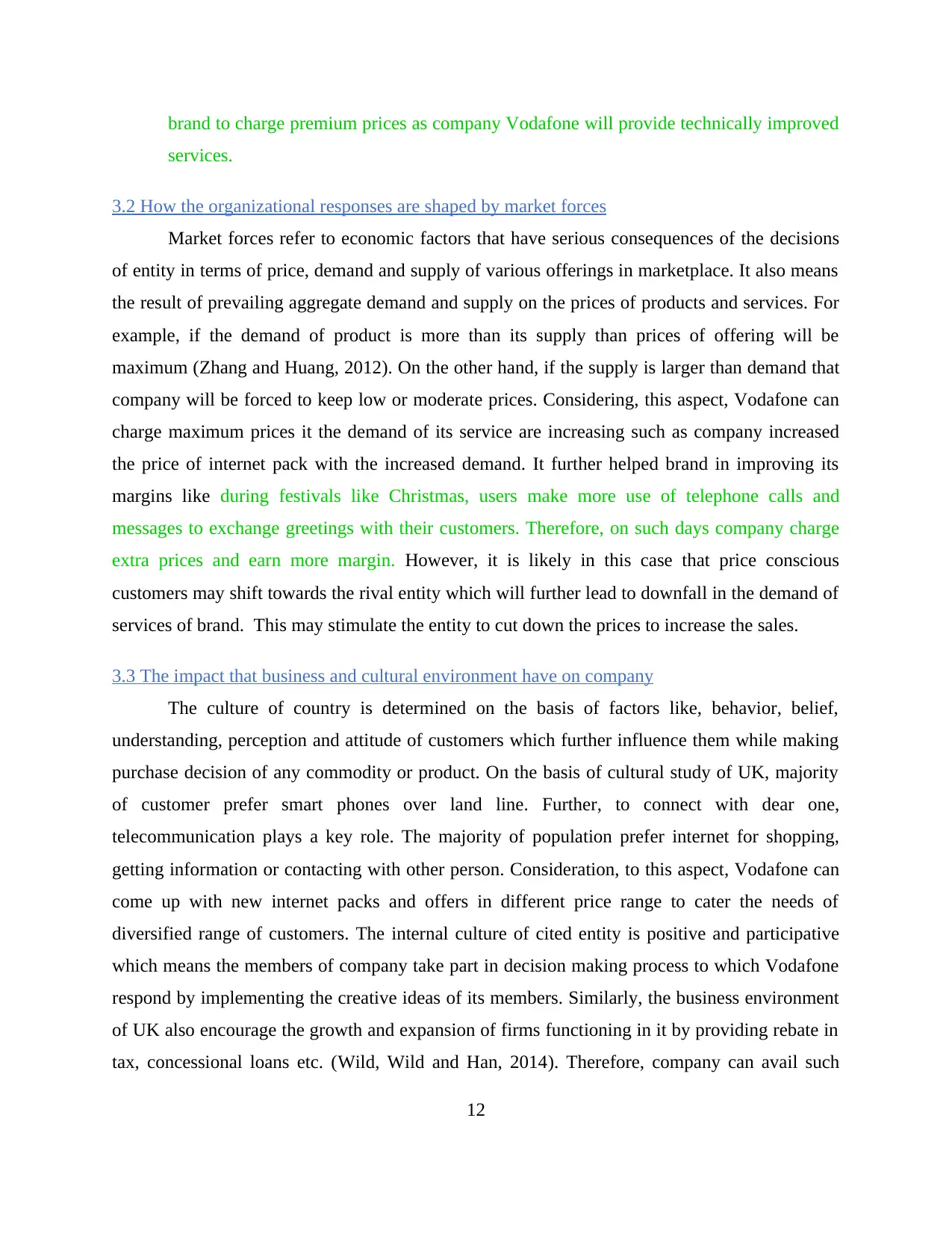
brand to charge premium prices as company Vodafone will provide technically improved
services.
3.2 How the organizational responses are shaped by market forces
Market forces refer to economic factors that have serious consequences of the decisions
of entity in terms of price, demand and supply of various offerings in marketplace. It also means
the result of prevailing aggregate demand and supply on the prices of products and services. For
example, if the demand of product is more than its supply than prices of offering will be
maximum (Zhang and Huang, 2012). On the other hand, if the supply is larger than demand that
company will be forced to keep low or moderate prices. Considering, this aspect, Vodafone can
charge maximum prices it the demand of its service are increasing such as company increased
the price of internet pack with the increased demand. It further helped brand in improving its
margins like during festivals like Christmas, users make more use of telephone calls and
messages to exchange greetings with their customers. Therefore, on such days company charge
extra prices and earn more margin. However, it is likely in this case that price conscious
customers may shift towards the rival entity which will further lead to downfall in the demand of
services of brand. This may stimulate the entity to cut down the prices to increase the sales.
3.3 The impact that business and cultural environment have on company
The culture of country is determined on the basis of factors like, behavior, belief,
understanding, perception and attitude of customers which further influence them while making
purchase decision of any commodity or product. On the basis of cultural study of UK, majority
of customer prefer smart phones over land line. Further, to connect with dear one,
telecommunication plays a key role. The majority of population prefer internet for shopping,
getting information or contacting with other person. Consideration, to this aspect, Vodafone can
come up with new internet packs and offers in different price range to cater the needs of
diversified range of customers. The internal culture of cited entity is positive and participative
which means the members of company take part in decision making process to which Vodafone
respond by implementing the creative ideas of its members. Similarly, the business environment
of UK also encourage the growth and expansion of firms functioning in it by providing rebate in
tax, concessional loans etc. (Wild, Wild and Han, 2014). Therefore, company can avail such
12
services.
3.2 How the organizational responses are shaped by market forces
Market forces refer to economic factors that have serious consequences of the decisions
of entity in terms of price, demand and supply of various offerings in marketplace. It also means
the result of prevailing aggregate demand and supply on the prices of products and services. For
example, if the demand of product is more than its supply than prices of offering will be
maximum (Zhang and Huang, 2012). On the other hand, if the supply is larger than demand that
company will be forced to keep low or moderate prices. Considering, this aspect, Vodafone can
charge maximum prices it the demand of its service are increasing such as company increased
the price of internet pack with the increased demand. It further helped brand in improving its
margins like during festivals like Christmas, users make more use of telephone calls and
messages to exchange greetings with their customers. Therefore, on such days company charge
extra prices and earn more margin. However, it is likely in this case that price conscious
customers may shift towards the rival entity which will further lead to downfall in the demand of
services of brand. This may stimulate the entity to cut down the prices to increase the sales.
3.3 The impact that business and cultural environment have on company
The culture of country is determined on the basis of factors like, behavior, belief,
understanding, perception and attitude of customers which further influence them while making
purchase decision of any commodity or product. On the basis of cultural study of UK, majority
of customer prefer smart phones over land line. Further, to connect with dear one,
telecommunication plays a key role. The majority of population prefer internet for shopping,
getting information or contacting with other person. Consideration, to this aspect, Vodafone can
come up with new internet packs and offers in different price range to cater the needs of
diversified range of customers. The internal culture of cited entity is positive and participative
which means the members of company take part in decision making process to which Vodafone
respond by implementing the creative ideas of its members. Similarly, the business environment
of UK also encourage the growth and expansion of firms functioning in it by providing rebate in
tax, concessional loans etc. (Wild, Wild and Han, 2014). Therefore, company can avail such
12
⊘ This is a preview!⊘
Do you want full access?
Subscribe today to unlock all pages.

Trusted by 1+ million students worldwide
1 out of 18
Related Documents
Your All-in-One AI-Powered Toolkit for Academic Success.
+13062052269
info@desklib.com
Available 24*7 on WhatsApp / Email
![[object Object]](/_next/static/media/star-bottom.7253800d.svg)
Unlock your academic potential
Copyright © 2020–2026 A2Z Services. All Rights Reserved. Developed and managed by ZUCOL.





